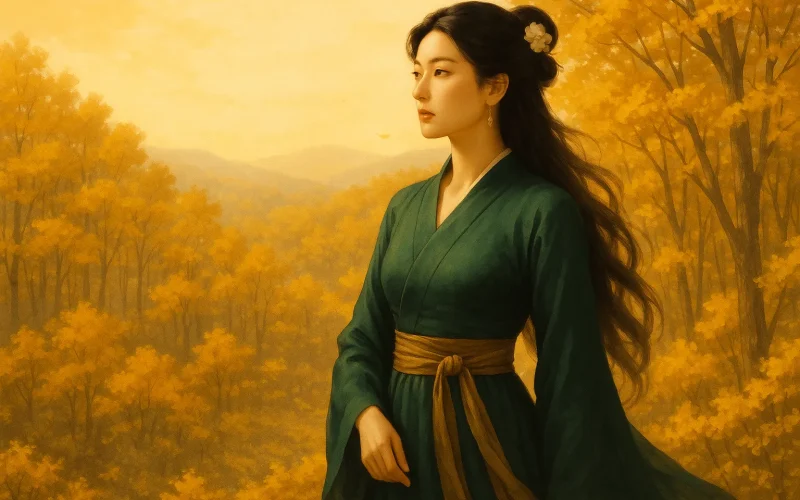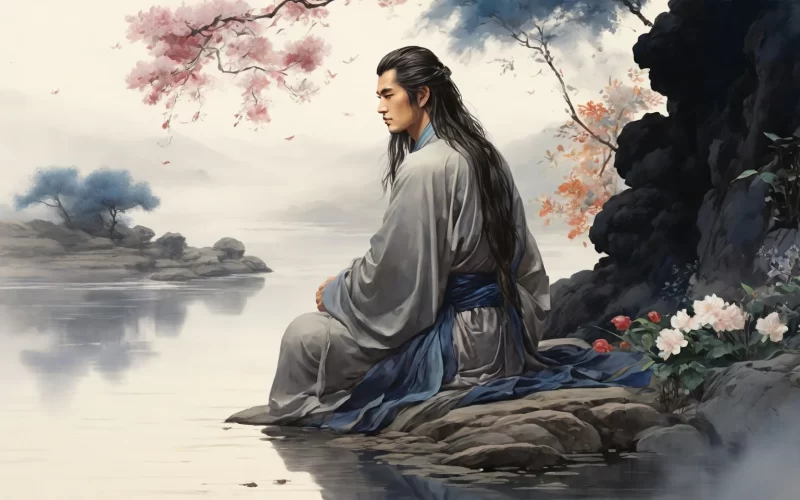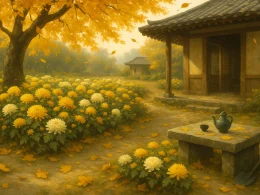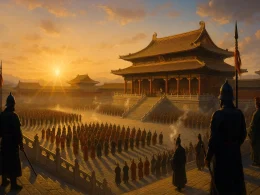The willow leaves fall in the northern state;
Alone I climb the tower and gaze afar.
The green cloud is severed from the sea great;
The Tartar’s land is laden with autumn hue.
The northern troops gather by the desert gate;
The Han envoy comes back from the Pass of Jade.
My lord won’t come back; I can but wait
In vain when the sweet grass turns sere in dew.
Original Poem
「秋思 · 其二」
李白
燕支黄叶落,妾望自登台。
海上碧云断,单于秋色来。
胡兵沙塞合,汉使玉关回。
征客无归日,空悲蕙草摧。
Interpretation
This poem is the second in Li Bai's "Autumn Longings" series, composed during the Kaiyuan and Tianbao eras of the Tang Dynasty against the backdrop of prolonged frontier warfare. With profound empathy and literary genius, Li Bai gives voice to an ordinary soldier's wife, capturing her moment of gazing from a high platform in autumn. He connects personal fate to the vast machinery of state warfare, revealing the silent trauma and perpetual waiting inflicted upon countless families by war.
First Couplet: "燕支黄叶落,妾望自登台。"
Yānzhī huángyè luò, qiè wàng zì dēng tái.
At Yan Zhi Mountain, yellow leaves fall; Alone I climb the watchtower, gazing afar.
The opening immediately directs the reader's gaze to the frontier with "Yan Zhi Mountain," where the woman's husband is stationed, creating instant spatial distance. "Yellow leaves fall" signifies deep autumn, where nature's decay mirrors her inner desolation. The word "alone" carries immense weight, highlighting her solitude and isolation. This figure, waiting day after day, year after year, becomes a tragic image of wordless sorrow.
Second Couplet: "海上碧云断,单于秋色来。"
Hǎi shàng bìyún duàn, chányú qiūsè lái.
Over the desert sea, azure clouds break; The autumn of the Chanyu descends.
This couplet paints a vast, desolate scene. "Desert sea" refers to the northern Gobi. "Azure clouds break" symbolizes the end of peaceful hopes. "The autumn of the Chanyu" is particularly meaningful: "Chanyu" (Xiongnu leader) represents the enemy, while "autumn" signifies not just a season but also slaughter, war, and death. The word "descends" conveys an approaching sense of crisis, elevating her personal worry to a profound fear for her husband's life and the nation's safety.
Third Couplet: "胡兵沙塞合,汉使玉关回。"
Hú bīng shā sāi hé, Hàn shǐ yù guān huí.
Tartar troops mass at the sandy frontier; Han envoys turn back from Jade Gate Pass.
With concise brushstrokes, the poet depicts a tense military situation. "Tartar troops mass" presents a dynamic, aggressive image, creating strong military pressure. Contrasted with this is "Han envoys turn back"; the word "turn" declares the complete failure of diplomatic efforts and peace hopes. This parallel couplet, with its "advance and retreat" structure, places personal fate within an irreversible national conflict, injecting deeper despair into the woman's wait.
Fourth Couplet: "征客无归日,空悲蕙草摧。"
Zhēng kè wú guī rì, kōng bēi huì cǎo cuī.
My warrior has no day of return; In vain I grieve for the withering iris.
The final couplet is the emotional climax and the final judgment of fate. "No day of return" shatters all illusions. "In vain I grieve for the withering iris" is the poignant highlight: "iris," a fragrant plant, symbolizes the woman's virtue and youth, often used in ancient poetry to convey longing. Now, withering in autumn, it mirrors her youth, beauty, and hopes, crushed by years of waiting. The words "in vain" and "wither" express the futility of life and powerlessness against fate, reaching an extreme of poignant sorrow.
Holistic Appreciation
The poem begins with the woman's action of "climbing the tower." Her gaze moves from near to far, from reality to imagination: from the "falling yellow leaves" before her, to the distant "desert sea" and "Chanyu," then to the imagined "Tartar troops" and "Han envoys," finally returning to her own life with the "withering iris." The emotion progresses layer by layer: from lonely longing, to anxiety about the situation, to shattered hopes, culminating in utter despair and lament for life. By placing the woman's personal tragedy against a broad historical backdrop, Li Bai elevates this short poem from an expression of personal separation to a profound portrayal of countless families shadowed by war, carrying strong social critique.
Artistic Merits
- Interweaving of Time and Space: The poem intertwines "Yan Zhi Mountain" (frontier space) with "watchtower" (the woman's space), and "autumn" (natural time) with "no day of return" (life time), creating a suffocating tragic spacetime.
- Symbolism and Suggestive Imagery: Images such as "yellow leaves," "breaking azure clouds," and "autumn" all symbolizethe fading of beauty and the withering of life; the use of the classic "iris" imagery gives abstract emotions concrete form, enhancing the poem's emotional impact.
- Precise Parallelism with Profound Meaning: The third couplet, "Tartar troops mass at the sandy frontier; Han envoys turn back from Jade Gate Pass," is not only formally parallel but also creates strong dramatic conflict, serving as the emotional pivot of the poem.
- Expressing Sorrow through Vast Landscapes: Li Bai employs his characteristic bold brushstrokes to depict the frontier scenery. The very vastness and desolation of this landscape instead accentuatethe insignificance and sorrow of the woman's personal fate, creating powerful artistic tension.
Insights
This millennial poem still allows us to feel the sharp, enduring pain born of war. It reminds us that behind grand historical narratives lie the sacrificed happiness and silent tears of countless individuals. Li Bai's greatness lies in seeing not only the game between "Tartar troops" and "Han envoys" but also the woman on the watchtower "grieving in vain for the withering iris." This enlightens us to cherish peaceful daily life and care for individual destinies affected by the tides of the times. True compassion is the ability to hear the faintest sigh and empathize deeply.
About the poet

Li Bai (李白), 701 - 762 A.D., whose ancestral home was in Gansu, was preceded by Li Guang, a general of the Han Dynasty. Tang poetry is one of the brightest constellations in the history of Chinese literature, and one of the brightest stars is Li Bai.












